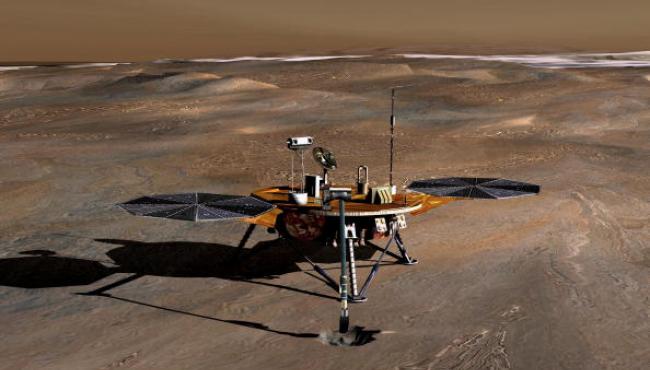

A sensing technique that the US military currently uses to remotely monitor the air to detect potentially life-threatening chemicals, toxins, and pathogens has inspired a new instrument that could “sniff” for life on Mars.
Don’t Miss: Best Black Friday TV Deals on Sale Now
The Bio-Indicator Lidar Instrument, or BILI is a fluorescence-based lidar, a type of remote-sensing instrument similar to radar in principle and operation.
Instead of using radio waves, however, lidar instruments use light to detect and ultimately analyze the composition of particles in the atmosphere.
Although NASA has used fluorescence instruments to detect chemicals in Earth’s atmosphere as part of its climate-studies research, the agency so far hasn’t employed the technique in planetary studies.

This artist’s rendition shows how a proposed laser-fluorescence instrument could operate on Mars. Credits: NASA
“NASA has never used it before for planetary ground level exploration. If the agency develops it, it will be the first of a kind,” said Branimir Blagojevic, a NASA technologist at the Goddard Space Flight Center in Greenbelt, Maryland.
Blagojevic, who formerly worked for Science and Engineering Services, LLC, that developed the sensor, has applied the technology to create an instrument prototype, proving in testing that the same remote-sensing technology used to identify bio-hazards in public places also could be effective at detecting organic bio-signatures on Mars.
The beauty of BILI is its ability to detect in real-time small levels of complex organic materials from a distance of several hundred meters, Blagojevic added in a NASA statement.
Therefore, it could autonomously search for bio-signatures in plumes above recurring slopes — areas not easily traversed by a rover carrying a variety of in-situ instruments for detailed chemical and biological analysis.
Furthermore, because it could do a ground-level aerosol analysis from afar, BILI reduces the risk of sample contamination that could skew the results.
“This makes our instrument an excellent complementary organic-detection instrument, which we could use in tandem with more sensitive, point sensor-type mass spectrometers that can only measure a small amount of material at once,” Blagojevic said.
“BILI’s measurements do not require consumables other than electrical power and can be conducted quickly over a broad area. This is a survey instrument, with a nose for certain molecules,” Blagojevic noted.
With such a tool, which also could be installed on an orbiting spacecraft, NASA could dramatically increase the probability of finding bio-signatures in the solar system, he added.
“We are ready to integrate and test this novel instrument, which would be capable of detecting a number organic bio-signatures,” Blagojevic said.
[Source:-14 U News]
